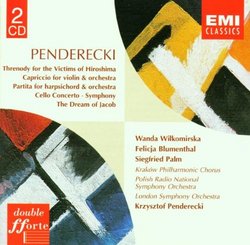| All Artists: Penderecki, Pnro, Lso Title: Penderecki: Orchestral Works, Vol. 01 Members Wishing: 1 Total Copies: 0 Label: EMI Classics Release Date: 7/3/2001 Album Type: Original recording remastered Genre: Classical Styles: Opera & Classical Vocal, Forms & Genres, Concertos, Historical Periods, Modern, 20th, & 21st Century, Instruments, Reeds & Winds, Symphonies Number of Discs: 2 SwapaCD Credits: 2 UPCs: 724357430227, 724357430258 |
Search - Penderecki, Pnro, Lso :: Penderecki: Orchestral Works, Vol. 01
 | Penderecki, Pnro, Lso Penderecki: Orchestral Works, Vol. 01 Genre: Classical
|
Larger Image |
CD Details |
CD ReviewsStaring into the abyss R. Hutchinson | a world ruled by fossil fuels and fossil minds | 06/18/2009 (5 out of 5 stars) "This is a fantastic two-disc set of Penderecki's avant-garde music of the 1960s (1959-1974), with seven pieces and 76 minutes on Disc One, and four pieces, including the first Symphony, and 72 minutes on Disc Two. (It was reissued in 2007 in the Gemini series.) All the music is conducted by the composer, and performed by the Polish Radio National Symphony Orchestra, except the first Symphony, performed by the London Symphony Orchestra. The original EMI recordings are from 1972, 1973 and 1975.
Penderecki blazed to fame shortly after graduating from the Krakow Academy of Music in 1958. He won awards in Poland with his compositions, and the "Threnody for the Victims of Hiroshima" won the UNESCO Prize in 1960. Other than "Hiroshima," I have found no political references regarding Penderecki's early music, but I can't help concluding from its tone that the composer was deeply affected by social and political events. This music is unremittingly dissonant and anguished, and it seems to be concentrating the sense of dread of living under the threat of all-out nuclear war which was especially intense before the SALT agreements of the 1970s. Some might consider these works to be dated, a symptom of the post-war avant-garde run amok, but I find them to continue to exert a baleful power, and as the new millennial world has certainly not given any cause for calm repose or complacency, they are arguably as relevant as ever. Of particular note is the "Symphony." In two movements, the first 19'51" and the second 11'23", it is an astonishing journey through sonorities and textures never before heard from an orchestra. But far from being a display of odd effects for their own sake, it tells a powerful story of wayfaring through a strange, dark land. It is one of the most powerful works of the late 20th century, and should not be missed by anyone interested in modern and contemporary music. Following the period represented here, Penderecki either retrenched or grew out of his avant phase, take your pick. Perhaps his most well-known work, the ST. LUKE PASSION for chorus and orchestra, is from the late 1960s, and so uses radical musical language to express the Catholic vision that would increasingly dominate Penderecki's music from the 1970s on, with more conventional, tonal means. It seems to me that he was on the edge, staring into the abyss, while writing his 1960s music. Then he, and the world, stepped back and kept going. In other words, I believe that he was a reluctant radical, unlike others of the avant-garde who persisted (and persist) with a radical vision, aesthetic, social, political, and/or spiritual, impervious to world events. I know there are those who think that either Penderecki's radical phase must have been insincere, or the more traditional music he has written since is insincere, but this music has the utmost integrity, and I believe that the same is true of the composer. I look forward to hearing more of his music. (See my review of Anne-Sophie Mutter's recording of his Violin Concerto No. 2, METAMORPHOSES.)" |

 Track Listings (8) - Disc #1
Track Listings (8) - Disc #1